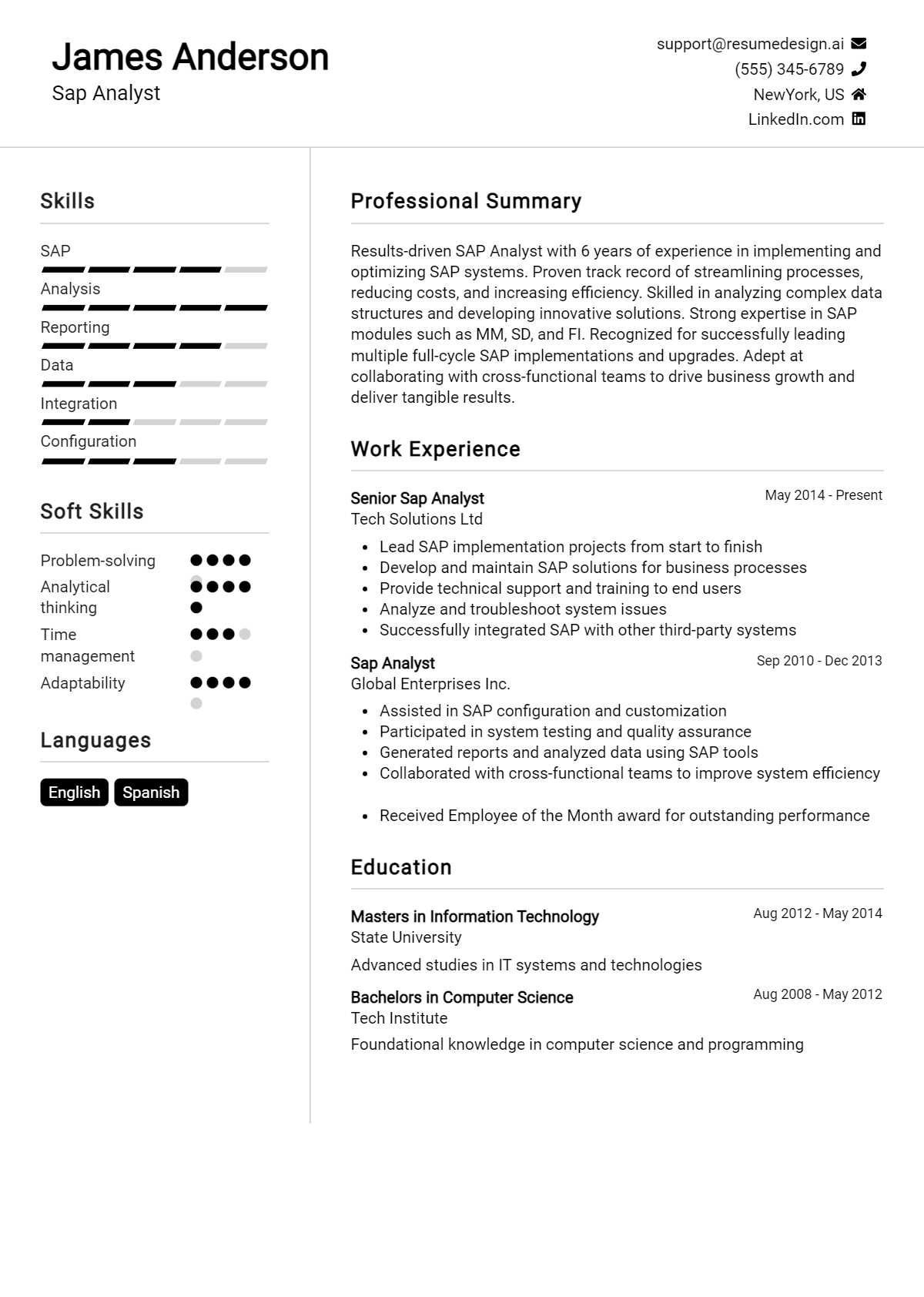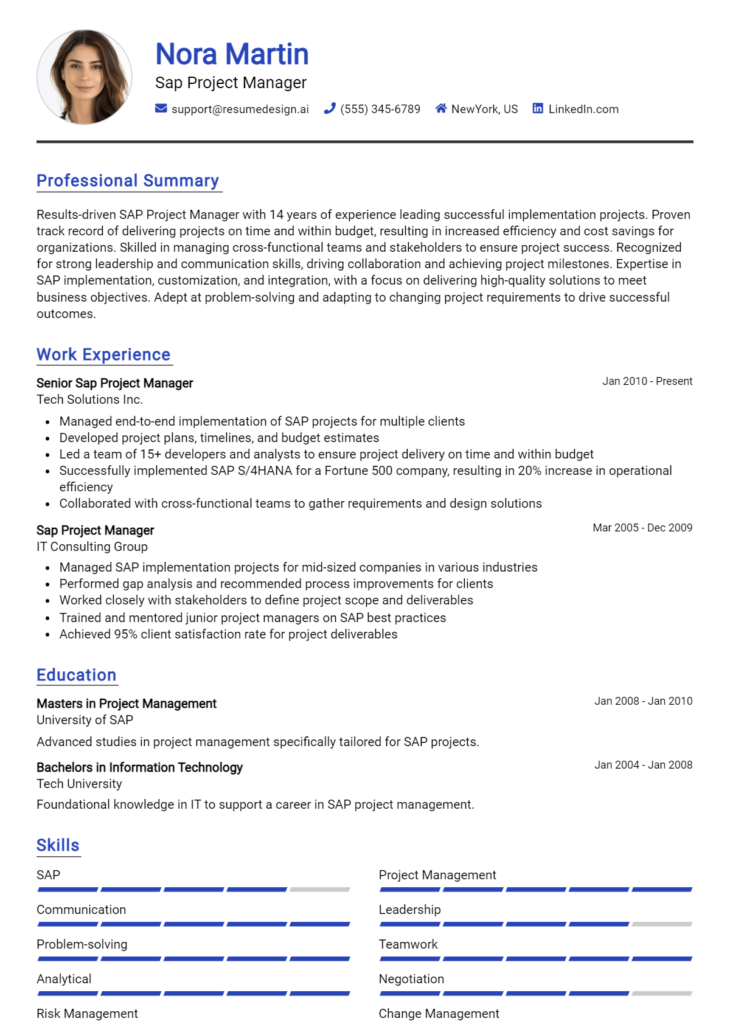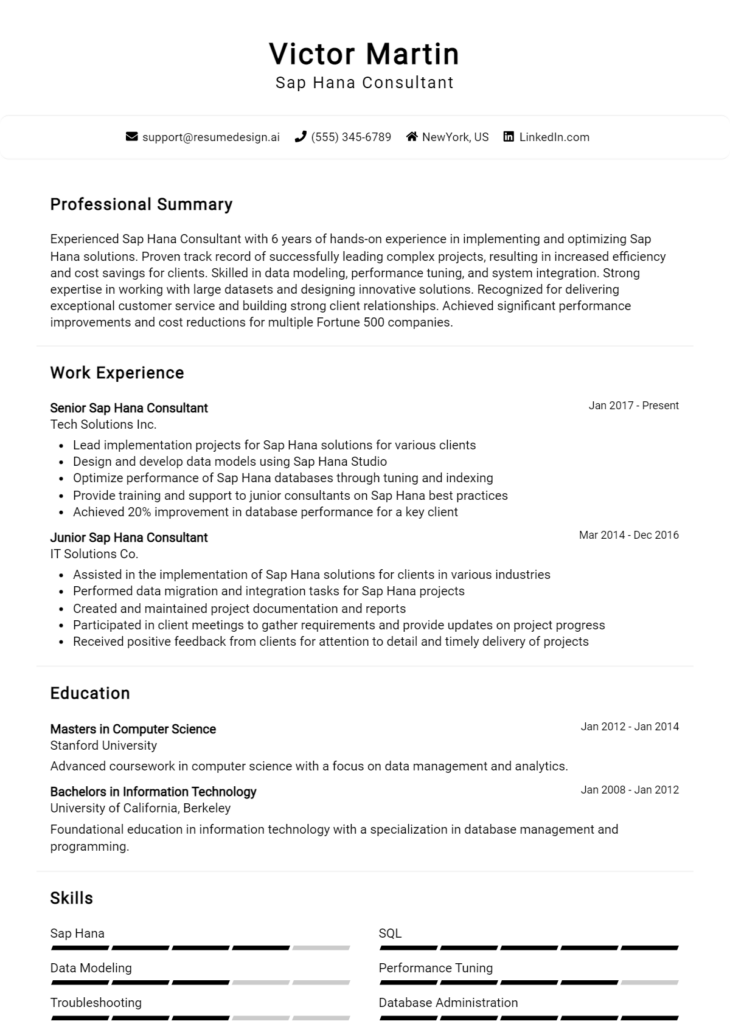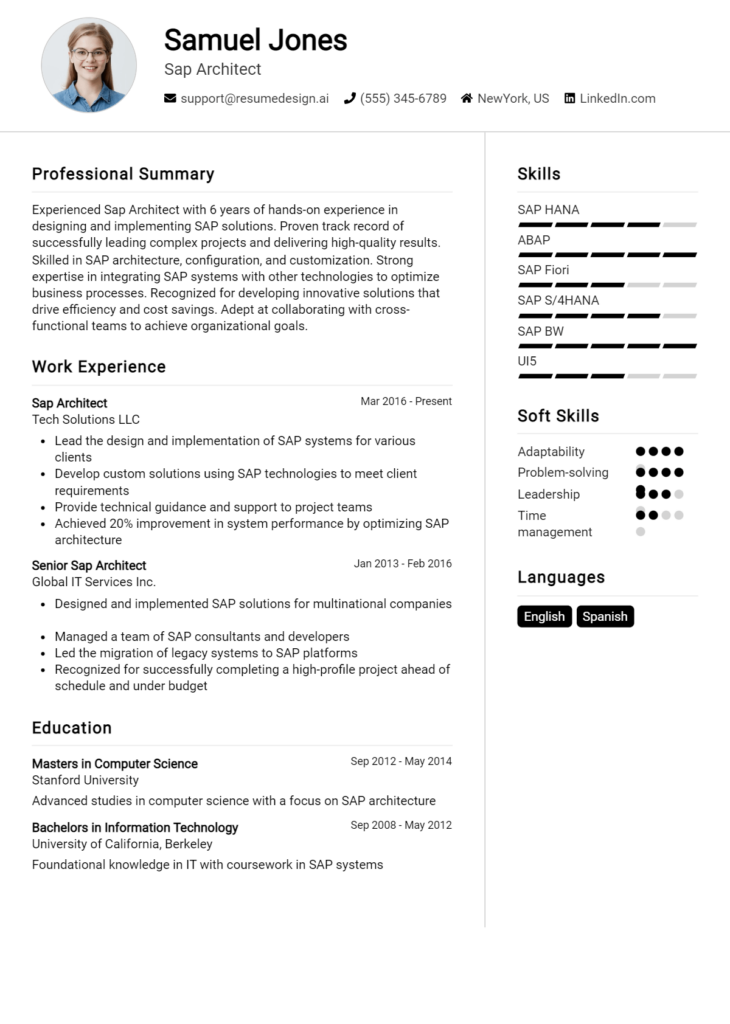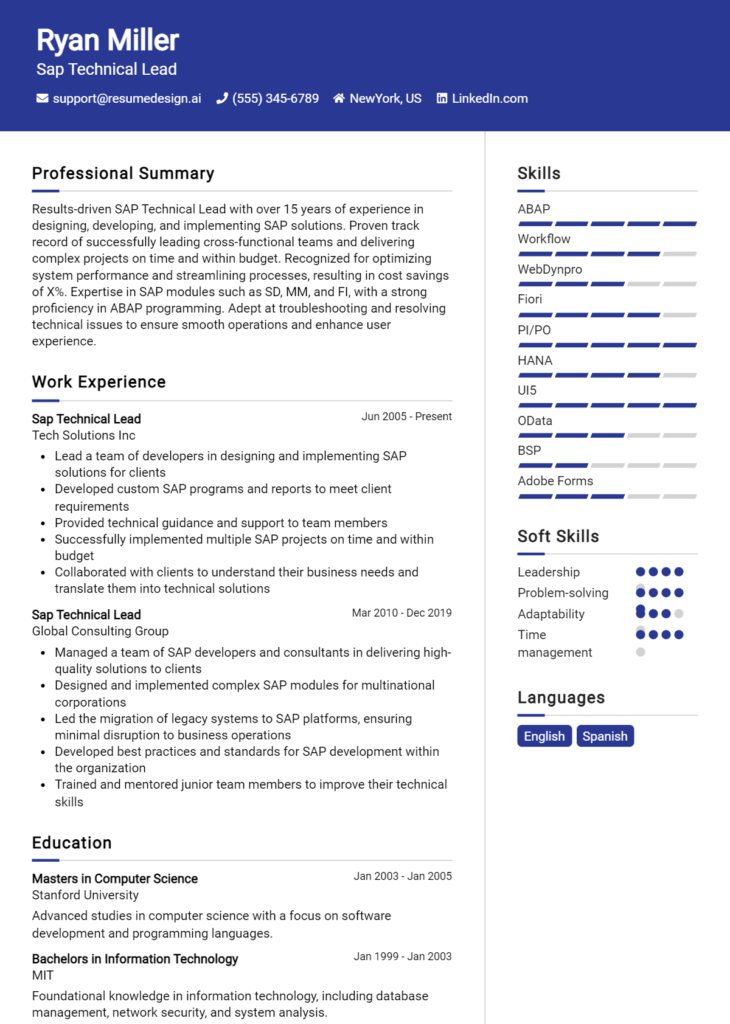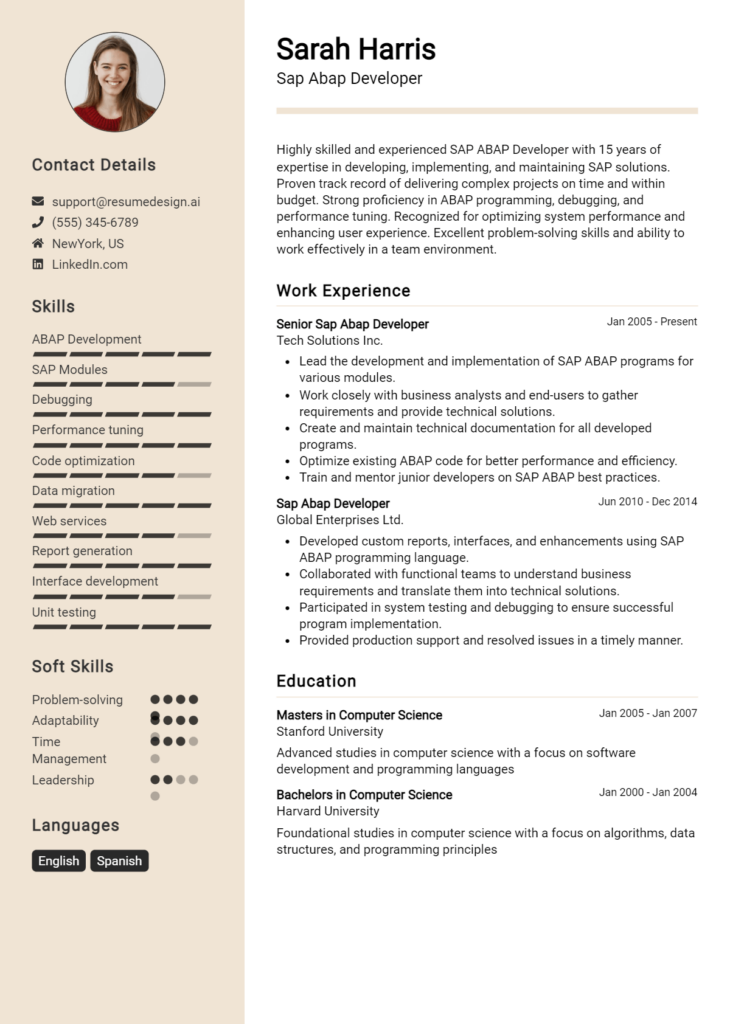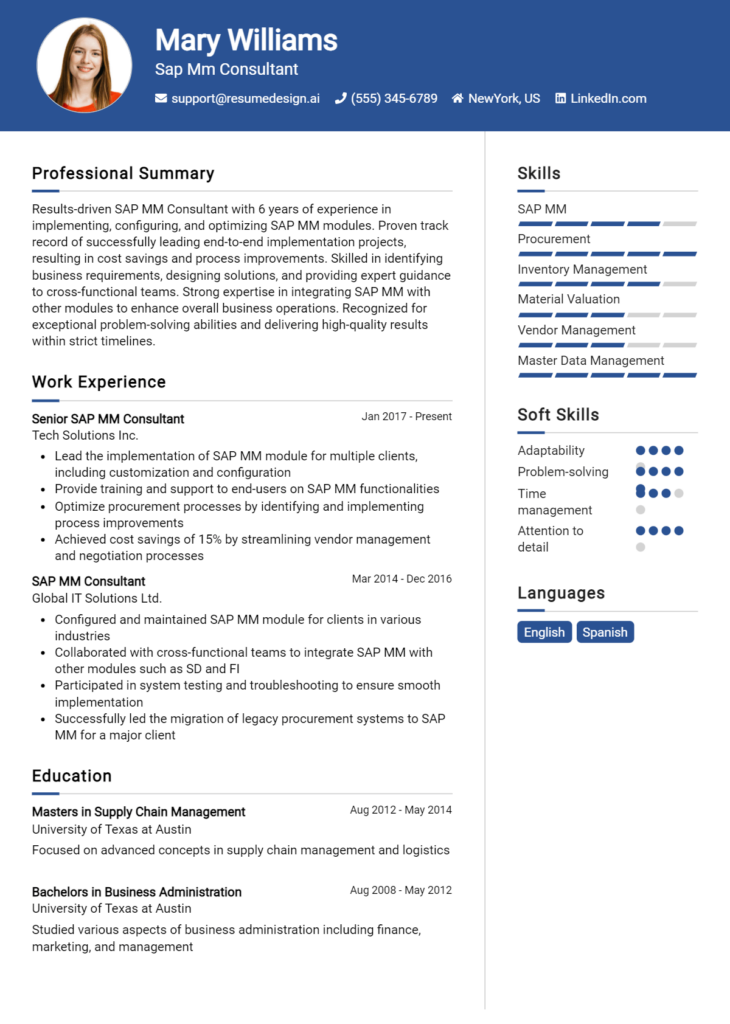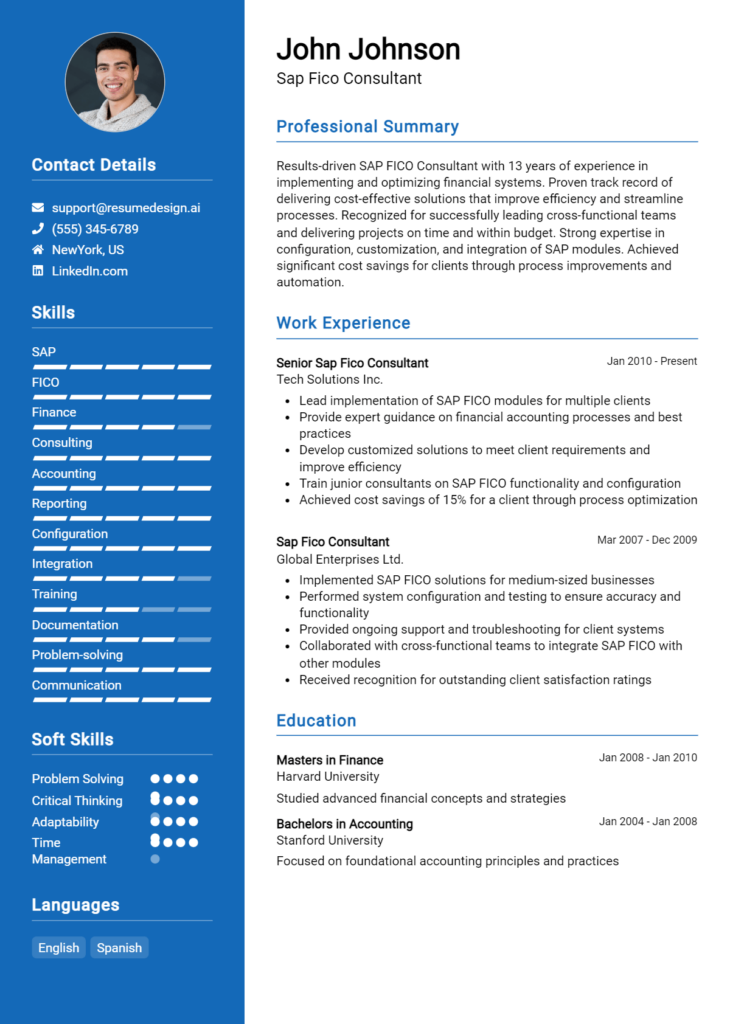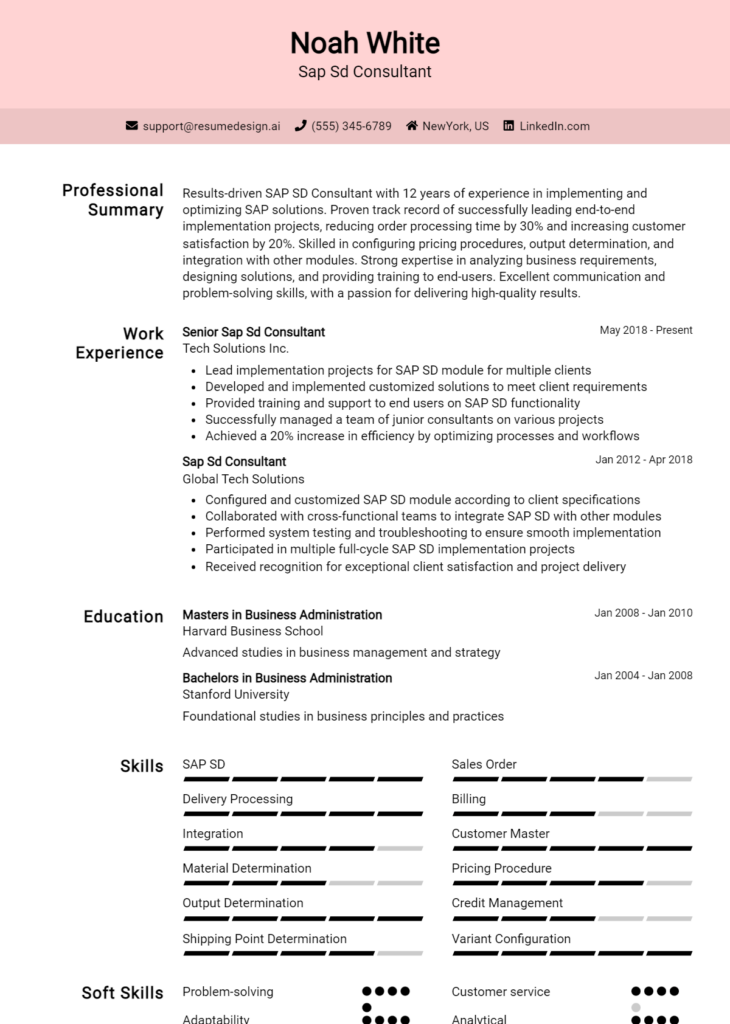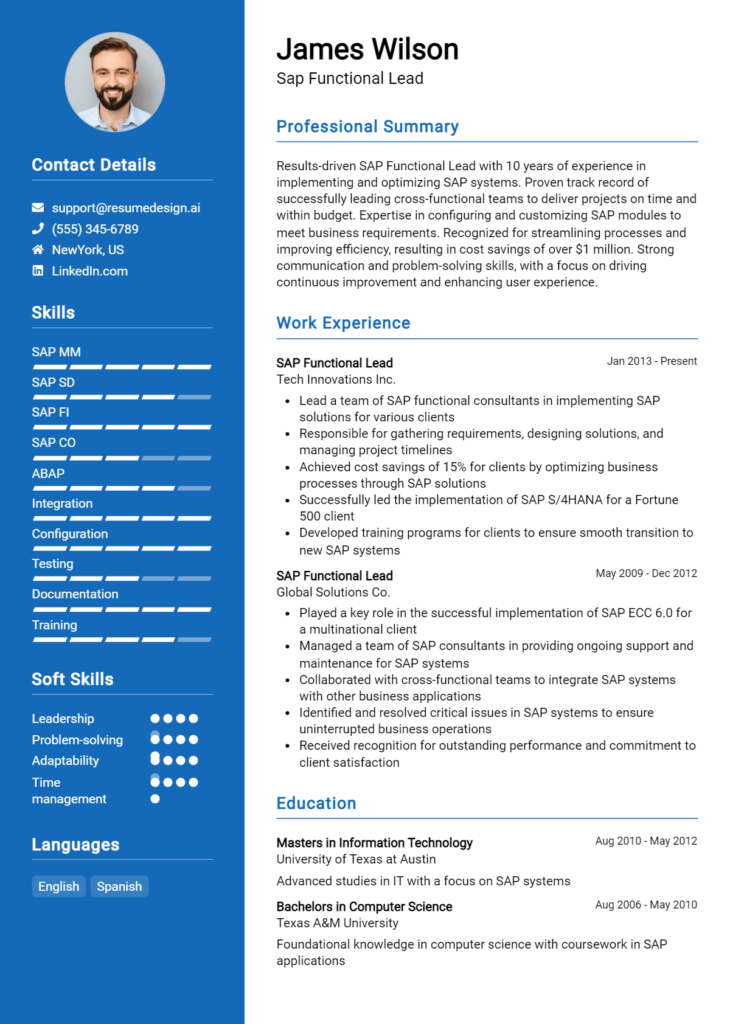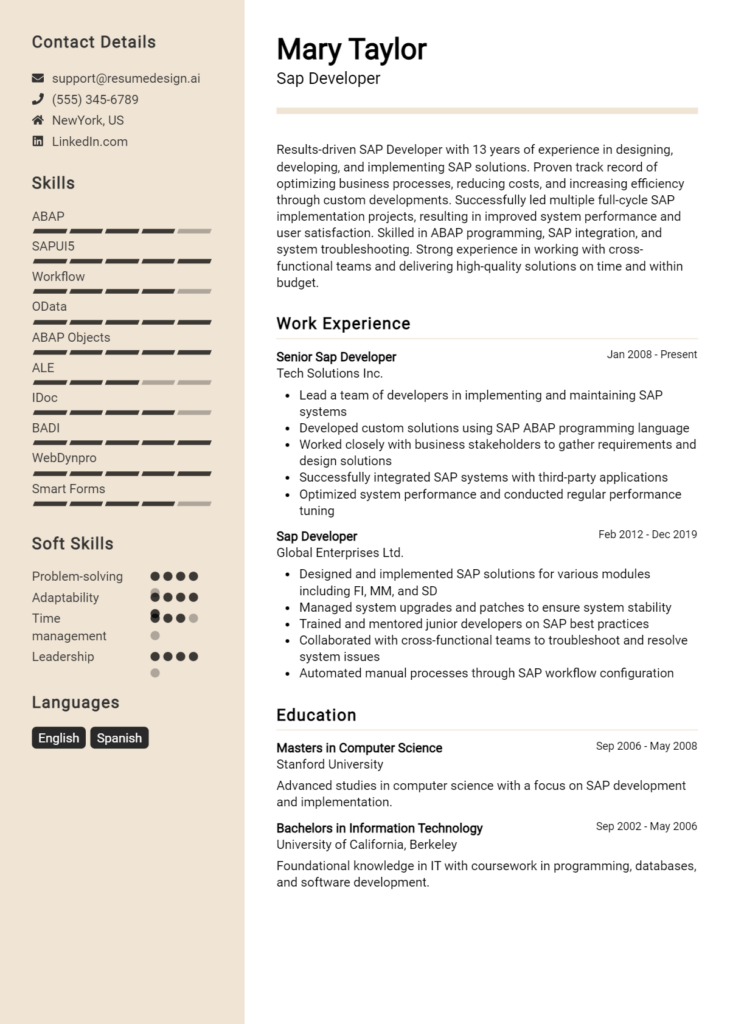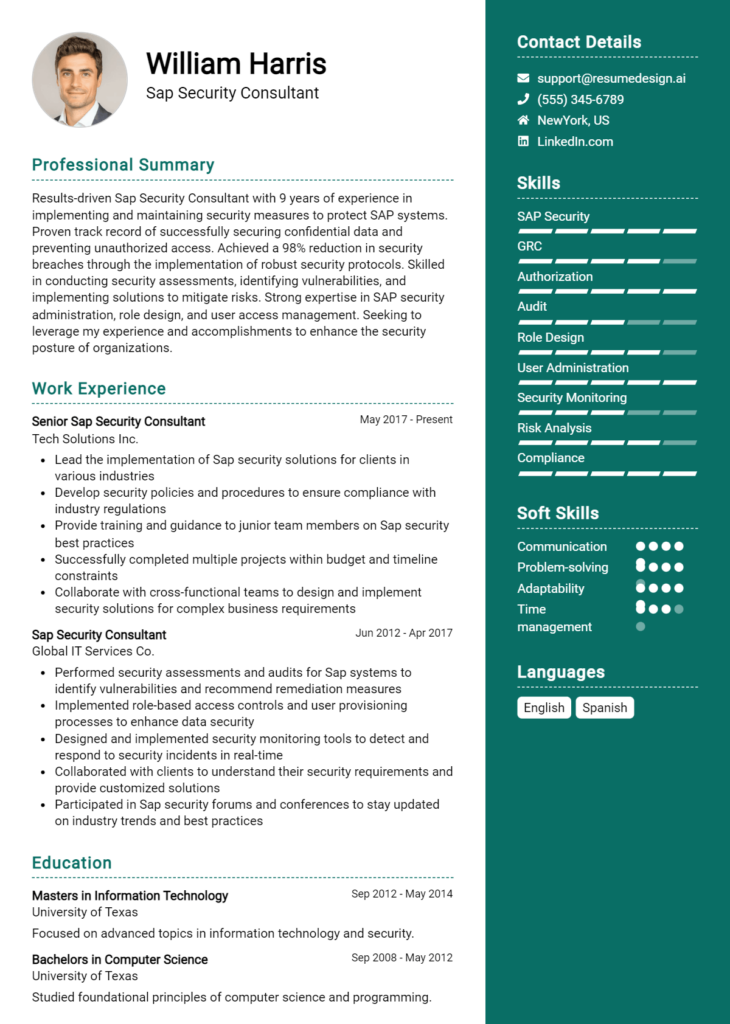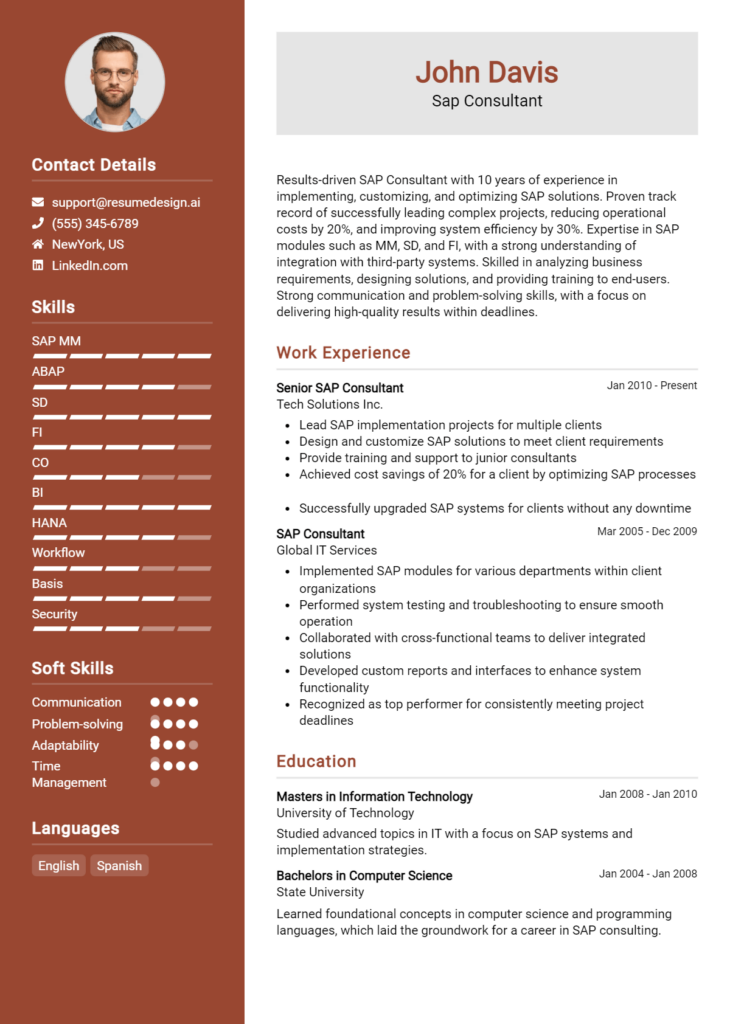SAP Analyst Core Responsibilities
An SAP Analyst plays a crucial role in bridging various departments by analyzing and optimizing business processes through SAP systems. Key responsibilities include gathering requirements, implementing solutions, and ensuring seamless integration between functions. Essential skills encompass technical expertise in SAP modules, operational insights, and strong problem-solving abilities. These competencies contribute significantly to organizational goals by enhancing efficiency and productivity. A well-structured resume can effectively highlight these qualifications, showcasing a candidate's potential impact on the business.
Common Responsibilities Listed on SAP Analyst Resume
- Conducting business process analysis and requirements gathering.
- Configuring and customizing SAP modules to meet business needs.
- Collaborating with cross-functional teams to implement SAP solutions.
- Providing support and training to end-users on SAP functionalities.
- Performing system testing and troubleshooting to resolve issues.
- Developing and maintaining documentation for SAP processes.
- Monitoring system performance and recommending improvements.
- Assisting in data migration and integration activities.
- Staying updated on SAP developments and best practices.
- Participating in project management activities related to SAP initiatives.
- Creating reports and dashboards to analyze business performance.
- Ensuring compliance with organizational policies and procedures.
High-Level Resume Tips for SAP Analyst Professionals
In today's competitive job market, a well-crafted resume is essential for SAP Analyst professionals looking to make a strong first impression on potential employers. Your resume is often the initial point of contact between you and a hiring manager, making it crucial to present a compelling narrative that reflects both your skills and achievements. A well-structured resume can effectively communicate your technical capabilities, project experiences, and the unique value you bring to the table. This guide will provide practical and actionable resume tips specifically tailored for SAP Analyst professionals, helping you to stand out in a sea of applicants.
Top Resume Tips for SAP Analyst Professionals
- Tailor your resume to match the specific job description, using keywords and phrases that align with the role.
- Highlight relevant experience, focusing on your roles in SAP implementations, upgrades, and support.
- Quantify your achievements with concrete metrics, such as cost savings, efficiency improvements, or successful project completions.
- Include industry-specific skills, such as knowledge of SAP modules (e.g., FI/CO, MM, SD) and relevant tools or technologies.
- Showcase your problem-solving abilities by detailing specific challenges you faced and how you overcame them.
- Use clear and concise language, avoiding jargon that may not be familiar to all readers.
- Incorporate certifications and training relevant to SAP, demonstrating your commitment to professional development.
- Maintain a clean and professional layout, ensuring that your resume is easy to read and visually appealing.
- Consider including a summary statement at the top of your resume that encapsulates your key qualifications and career goals.
- Proofread meticulously to eliminate any spelling or grammatical errors that could detract from your professionalism.
By implementing these tips, you can significantly increase your chances of landing a job in the SAP Analyst field. A targeted and polished resume will not only showcase your qualifications but also demonstrate your dedication and attention to detail, making you a more appealing candidate to prospective employers.
Why Resume Headlines & Titles are Important for SAP Analyst
In the competitive landscape of job applications, resume headlines and titles play a critical role in capturing the attention of hiring managers, especially for specialized roles like an SAP Analyst. A strong headline or title serves as the first impression a candidate makes on a potential employer, summarizing key qualifications and setting the tone for the rest of the resume. It should be concise and relevant, effectively conveying the candidate’s expertise in SAP systems, analytical skills, and contributions to previous projects. By crafting an impactful headline, candidates can increase their chances of standing out in a crowded applicant pool.
Best Practices for Crafting Resume Headlines for SAP Analyst
- Keep it concise—aim for one impactful phrase.
- Use specific keywords related to SAP and data analysis.
- Highlight relevant skills or certifications that align with the job description.
- Focus on achievements or experiences that demonstrate value.
- Avoid generic terms; tailor each headline to the specific job application.
- Consider your audience—use industry-relevant terminology.
- Make it action-oriented, if possible, to convey initiative.
- Review and revise to ensure clarity and impact.
Example Resume Headlines for SAP Analyst
Strong Resume Headlines
Results-Driven SAP Analyst with 5+ Years of Experience in Process Optimization
Detail-Oriented SAP Specialist Skilled in Data Migration and System Integration
Certified SAP Consultant with Proven Track Record in Enhancing System Performance
Dynamic SAP Analyst with Expertise in Financial Reporting and Data Analysis
Weak Resume Headlines
SAP Analyst Looking for Opportunities
Experienced Analyst
SAP Professional
Strong headlines are effective because they immediately communicate the candidate's specific skills and experiences that are relevant to the role of an SAP Analyst. They provide insight into what the candidate brings to the table, making it easier for hiring managers to see the value at a glance. In contrast, weak headlines fail to impress because they lack specificity and do not convey any unique qualifications or strengths. Generic titles can make a candidate appear unremarkable and indistinguishable from others, diminishing their chances of catching the employer's eye.
Writing an Exceptional SAP Analyst Resume Summary
A resume summary is a crucial component for an SAP Analyst, serving as the first impression for hiring managers. This brief yet powerful section encapsulates the candidate's core skills, relevant experience, and notable accomplishments, making it essential to capture attention quickly. A well-crafted summary not only highlights what the candidate brings to the table but also aligns with the specific needs of the employer. It should be concise, impactful, and tailored to the job description, ensuring that the most pertinent information is conveyed at a glance.
Best Practices for Writing a SAP Analyst Resume Summary
- Quantify achievements: Use metrics and numbers to demonstrate the impact of your work.
- Focus on relevant skills: Highlight skills that are specifically mentioned in the job description.
- Keep it concise: Aim for 3-5 sentences that encapsulate your professional identity.
- Use action verbs: Start sentences with strong action verbs to convey confidence and proactivity.
- Tailor to the job: Customize your summary for each application, reflecting the key requirements of the job.
- Showcase industry knowledge: Mention relevant software, methodologies, or frameworks that highlight your expertise.
- Highlight key accomplishments: Include significant projects or milestones that demonstrate your capabilities.
- Maintain professionalism: Use a formal tone and avoid jargon or overly casual language.
Example SAP Analyst Resume Summaries
Strong Resume Summaries
Results-driven SAP Analyst with over 5 years of experience in optimizing business processes through SAP modules. Successfully led a project that improved inventory management, reducing excess stock by 30%, while enhancing reporting accuracy. Proficient in SAP S/4HANA and ABAP programming.
Detail-oriented SAP Analyst with a proven track record of implementing solutions that enhance operational efficiency. Spearheaded a cross-functional initiative that boosted user satisfaction scores by 25% through effective training and support. Strong expertise in data analysis and SAP BW.
Dynamic SAP Analyst with expertise in SAP FI/CO, delivering actionable insights that drive financial performance. Instrumental in developing a budgeting tool that reduced forecasting errors by 40%, ensuring budget adherence and financial accuracy.
Weak Resume Summaries
Experienced analyst with knowledge of SAP tools. Worked on various projects and have some skills in data analysis.
SAP professional with a background in IT. Familiar with different software and have been part of teams in various roles.
The strong resume summaries are considered effective because they provide specific details about the candidate's achievements, quantify results, and demonstrate a clear alignment with the role of an SAP Analyst. In contrast, the weak summaries lack specificity, fail to quantify outcomes, and appear generic, making it difficult for hiring managers to assess the candidate's suitability for the position.
Work Experience Section for SAP Analyst Resume
The work experience section of an SAP Analyst resume is crucial as it not only highlights the candidate's technical skills but also demonstrates their ability to manage teams and deliver high-quality products. This section serves as a narrative of the candidate’s professional journey, showcasing their hands-on experience with SAP solutions, project management, and problem-solving abilities. By quantifying achievements—such as successful project implementations and process improvements—and aligning their experience with industry standards, candidates can effectively convey their value to potential employers, making this section one of the most important components of the resume.
Best Practices for SAP Analyst Work Experience
- Clearly outline relevant technical skills and tools used in each role.
- Quantify achievements with specific metrics (e.g., percentage of efficiency improvements).
- Highlight leadership and collaborative efforts in project teams.
- Use action verbs to convey responsibilities and accomplishments effectively.
- Align experiences with the job description and industry standards.
- Focus on outcomes and the impact of your contributions to the organization.
- Include certifications or relevant training that enhance your qualifications.
- Tailor the work experience section to reflect the most pertinent roles relevant to SAP analysis.
Example Work Experiences for SAP Analyst
Strong Experiences
- Led a cross-functional team in the successful implementation of SAP S/4HANA, resulting in a 30% reduction in processing time and enhanced data accuracy.
- Developed and optimized SAP reports that improved decision-making speed by 25% for senior management.
- Collaborated with IT and business units to design a custom SAP module that increased inventory management efficiency by 40%.
- Managed a team of 5 analysts in a project that integrated SAP SuccessFactors, resulting in a 50% increase in employee satisfaction scores.
Weak Experiences
- Worked on various SAP projects.
- Assisted in the SAP system upgrades.
- Involved in team meetings regarding SAP issues.
- Helped with SAP data entry tasks.
The experiences listed as strong emphasize quantifiable outcomes, technical leadership, and collaboration, showcasing the candidate's direct impact on business processes and team dynamics. In contrast, the weak experiences lack specificity and measurable results, making them less impactful and failing to demonstrate the candidate's true capabilities and contributions within the SAP environment.
Education and Certifications Section for SAP Analyst Resume
The education and certifications section of an SAP Analyst resume is crucial as it serves to showcase the candidate's academic background and qualifications that are directly relevant to the SAP ecosystem. This section not only emphasizes formal education, such as degrees in information technology, business management, or systems analysis but also highlights industry-relevant certifications that validate the candidate's expertise in SAP technologies. Continuous learning is essential in the rapidly evolving field of SAP, and showcasing relevant coursework, certifications, and specialized training can greatly enhance a candidate's credibility and alignment with the job role. Employers are often looking for candidates who demonstrate a commitment to professional development and possess the skills necessary to navigate complex SAP environments effectively.
Best Practices for SAP Analyst Education and Certifications
- Focus on relevant degrees such as Computer Science, Information Systems, or Business Analysis.
- Highlight industry-recognized certifications like SAP Certified Application Associate or SAP Certified Technology Associate.
- Include specific coursework related to SAP modules or systems that directly apply to the job role.
- List any ongoing education or training programs that reflect continuous learning in SAP technologies.
- Prioritize certifications that demonstrate advanced knowledge or specialization in areas such as SAP HANA, S/4HANA, or SAP Analytics Cloud.
- Keep the section organized and concise, using bullet points for easy readability.
- Use clear and professional language to describe educational achievements and certifications.
- Consider including honors or special projects that involved SAP implementation or analysis.
Example Education and Certifications for SAP Analyst
Strong Examples
- Bachelor of Science in Information Systems, XYZ University, 2020
- SAP Certified Application Associate - SAP S/4HANA for Financial Accounting, 2021
- Advanced SAP BusinessObjects Reporting and Analysis, ABC Institute, 2022
- Coursework: SAP ERP Implementation Strategies, SAP Data Management, and Analytics, 2019
Weak Examples
- Bachelor of Arts in History, XYZ University, 2015
- Certified Microsoft Office Specialist, 2019
- Coursework: Introduction to Sociology, 2017
- Outdated SAP Certified Associate (Version 4.6), 2010
The strong examples are considered relevant as they directly align with the requirements of an SAP Analyst role, showcasing both educational qualifications and certifications that are recognized in the industry. These examples reflect a solid foundation in SAP principles and practices, as well as ongoing professional development. In contrast, the weak examples lack relevance to the SAP field, featuring degrees and certifications that do not contribute to the candidate's qualifications for an SAP Analyst position. Outdated certifications and unrelated coursework diminish the credibility of the candidate in the context of SAP analysis and implementation.
Top Skills & Keywords for SAP Analyst Resume
As an SAP Analyst, possessing the right skills is crucial for effectively navigating the complexities of SAP systems and ensuring seamless business operations. A well-crafted resume that highlights both hard and soft skills can significantly enhance your chances of getting noticed by potential employers. The demand for SAP Analysts continues to grow as companies seek professionals who can leverage SAP software to optimize processes and drive efficiency. By emphasizing your skills in your resume, you not only showcase your technical capabilities but also your interpersonal attributes that are essential for collaboration and problem-solving in a team environment.
Top Hard & Soft Skills for SAP Analyst
Soft Skills
- Analytical Thinking: Ability to assess complex data and derive actionable insights.
- Communication: Proficient in both verbal and written communication to convey technical information clearly.
- Problem-Solving: Strong skills in identifying issues and developing effective solutions.
- Team Collaboration: Experience working in diverse teams to achieve common goals.
- Adaptability: Flexibility in adapting to new tools and changing business environments.
- Attention to Detail: Meticulous approach to data analysis and documentation.
- Time Management: Ability to prioritize tasks and manage multiple projects efficiently.
- Customer Focus: Understanding client needs and delivering solutions that meet those needs.
- Critical Thinking: Strong capacity to evaluate information critically and make informed decisions.
- Conflict Resolution: Skills in mediating disagreements and facilitating consensus among stakeholders.
Hard Skills
- SAP Modules Proficiency: In-depth knowledge of various SAP modules (e.g., SAP FI, CO, MM, SD).
- Data Analysis: Expertise in analyzing large datasets using tools like SAP BW or SAP HANA.
- Business Process Mapping: Experience in documenting and optimizing business processes.
- SQL: Proficient in SQL for querying databases and generating reports.
- Report Generation: Ability to create detailed reports and dashboards using SAP reporting tools.
- Integration Skills: Knowledge of integrating SAP with other systems (e.g., third-party applications).
- Configuration Skills: Experience in configuring SAP settings to meet business requirements.
- Project Management: Familiarity with project management methodologies (e.g., Agile, Waterfall).
- System Testing: Skills in conducting system testing and user acceptance testing (UAT).
- Documentation: Strong skills in preparing technical documentation and user manuals.
- SAP Security: Understanding of SAP security protocols and user access management.
- Regulatory Compliance: Knowledge of compliance standards relevant to SAP systems.
- User Training: Experience in training end-users on SAP functionalities and best practices.
- Change Management: Skills in managing organizational change related to SAP implementations.
- Performance Tuning: Understanding of techniques for optimizing SAP system performance.
- Scripting Languages: Familiarity with scripting for automation (e.g., ABAP, Python).
- Cloud Technologies: Knowledge of SAP cloud solutions and services.
- Data Migration: Experience in data migration strategies and execution within SAP environments.
For more information on skills and work experience, be sure to explore additional resources to enhance your resume.
Stand Out with a Winning SAP Analyst Cover Letter
Dear [Hiring Manager's Name],
I am writing to express my interest in the SAP Analyst position at [Company Name] as advertised. With a solid background in SAP systems and a passion for leveraging technology to optimize business processes, I am excited about the opportunity to contribute to your team. My experience in analyzing and implementing SAP solutions has equipped me with the skills needed to enhance operational efficiency and drive strategic initiatives that align with organizational goals.
In my previous role at [Previous Company Name], I was responsible for the end-to-end implementation of SAP modules, collaborating with cross-functional teams to identify system requirements and develop solutions tailored to meet business needs. My keen analytical skills allowed me to identify process gaps and recommend enhancements that resulted in a 20% increase in productivity. Additionally, my proficiency in data analysis and reporting tools enabled me to provide actionable insights that supported decision-making at various organizational levels.
I am particularly drawn to the innovative approach that [Company Name] takes towards integrating SAP solutions to drive business growth. I am eager to bring my expertise in system analysis, user training, and project management to your team. I thrive in dynamic environments and am committed to continuous learning and professional development, ensuring that I remain at the forefront of SAP technologies and best practices.
Thank you for considering my application. I would love the opportunity to discuss how my skills and experiences can contribute to the success of [Company Name]. I look forward to the possibility of working together to enhance your SAP capabilities and achieve your business objectives.
Sincerely,
[Your Name]
[Your Contact Information]
Common Mistakes to Avoid in a SAP Analyst Resume
When crafting a resume for the SAP Analyst role, it's crucial to avoid common pitfalls that can undermine your qualifications and reduce your chances of landing an interview. A well-structured resume can showcase your skills and experience effectively, but specific mistakes can detract from your professionalism and relevance to the job. Here are some common mistakes to watch out for:
Lack of Relevant Keywords: Failing to incorporate industry-specific keywords can result in your resume being overlooked by Applicant Tracking Systems (ATS). Be sure to include terms related to SAP modules, data analysis, and project management.
Overloading with Technical Jargon: While it's essential to demonstrate your technical expertise, using too much jargon can alienate non-technical hiring managers. Strive for a balance that showcases your skills without overwhelming the reader.
Vague Job Descriptions: Providing generic descriptions of your roles can make it difficult for employers to understand your specific contributions and achievements. Use quantifiable metrics and detailed descriptions to illustrate your impact.
Ignoring Soft Skills: SAP Analysts often need strong communication and teamwork abilities. Failing to highlight these soft skills can make your resume less compelling. Include examples of how you've successfully collaborated with others.
Inconsistent Formatting: A disorganized or inconsistent format can make your resume hard to read and unprofessional. Ensure that your font, bullet points, and spacing are uniform throughout the document.
Too Much Focus on Responsibilities Over Achievements: Many candidates list their job responsibilities but neglect to highlight their achievements. Focus on what you accomplished in each role, using action verbs and quantifiable results.
Neglecting Education and Certifications: Given the technical nature of the role, omitting relevant education and certifications can weaken your resume. Ensure that you prominently feature your SAP certifications and any related coursework.
Typos and Grammatical Errors: Spelling mistakes and grammatical errors can create a negative impression and suggest a lack of attention to detail. Always proofread your resume multiple times and consider having someone else review it as well.
Conclusion
As an SAP Analyst, effectively showcasing your skills and experiences in your resume is crucial for standing out in a competitive job market. Key responsibilities of this role include analyzing business processes, implementing SAP solutions, and collaborating with various stakeholders to ensure that systems meet organizational needs. Understanding the technical aspects of SAP software, as well as possessing strong problem-solving and communication skills, are vital to success in this position.
To enhance your chances of landing your desired role, it’s important to tailor your resume to highlight your relevant experience and competencies. Make sure to emphasize your proficiency in SAP modules, project management experience, and any certifications you may hold. Additionally, quantifying your achievements can help demonstrate your impact in previous roles.
Now is the perfect time to review and refine your SAP Analyst resume. Check out the variety of tools available to assist you in this process. Utilize resume templates to create a polished layout, or explore the resume builder for an easy way to craft your document. You can also browse resume examples for inspiration and guidance on successful formats, and don’t forget to enhance your application with compelling cover letter templates. Take action today to ensure your resume captures the attention of hiring managers and showcases your qualifications effectively!

